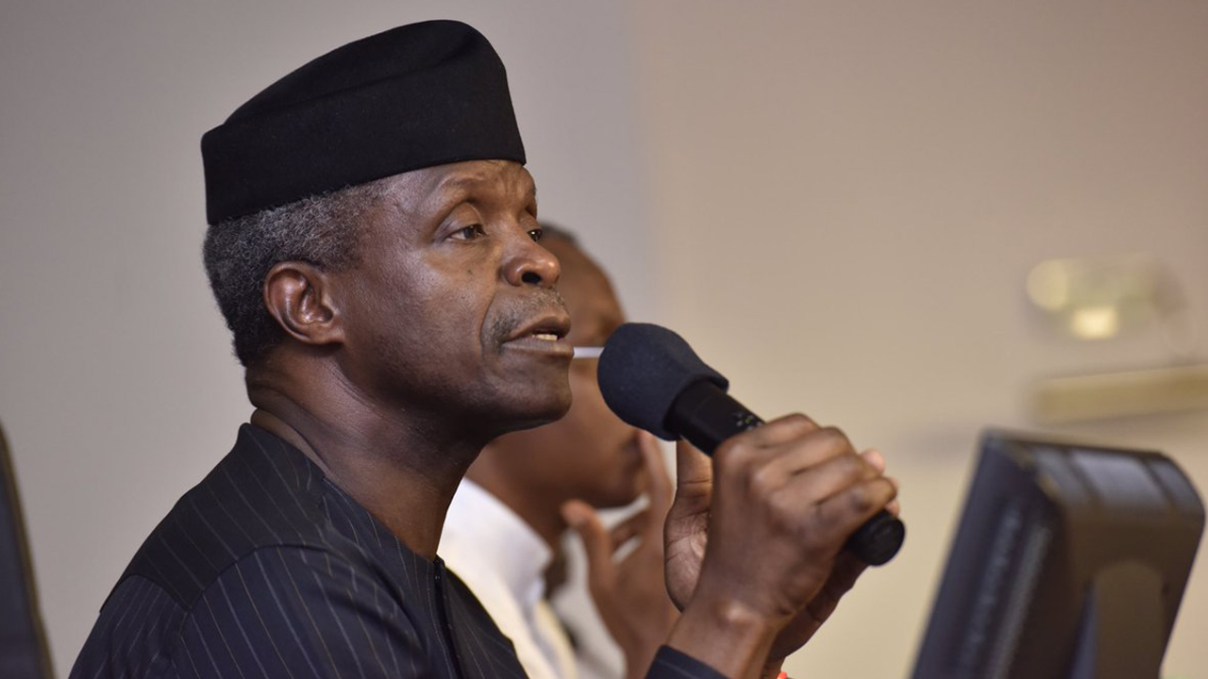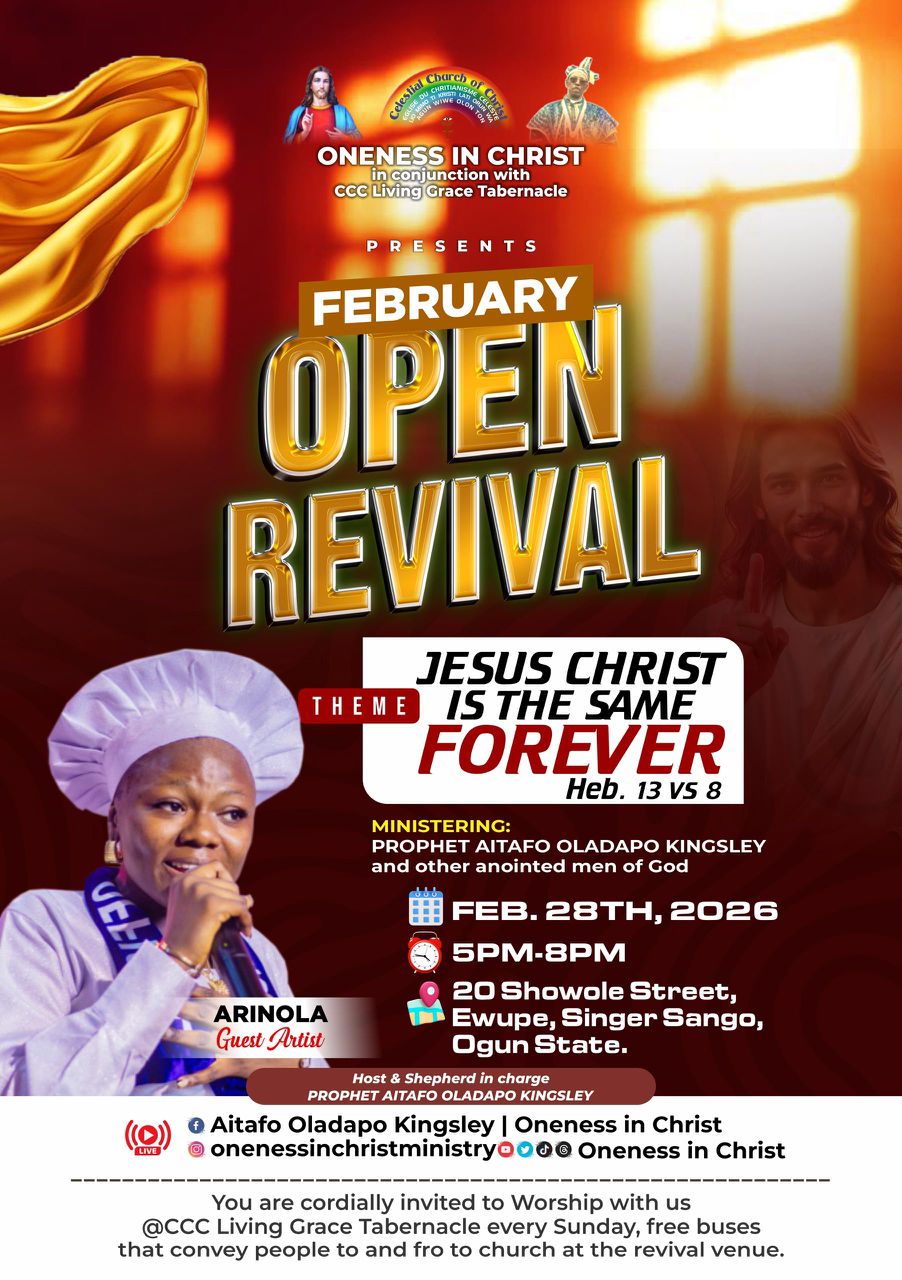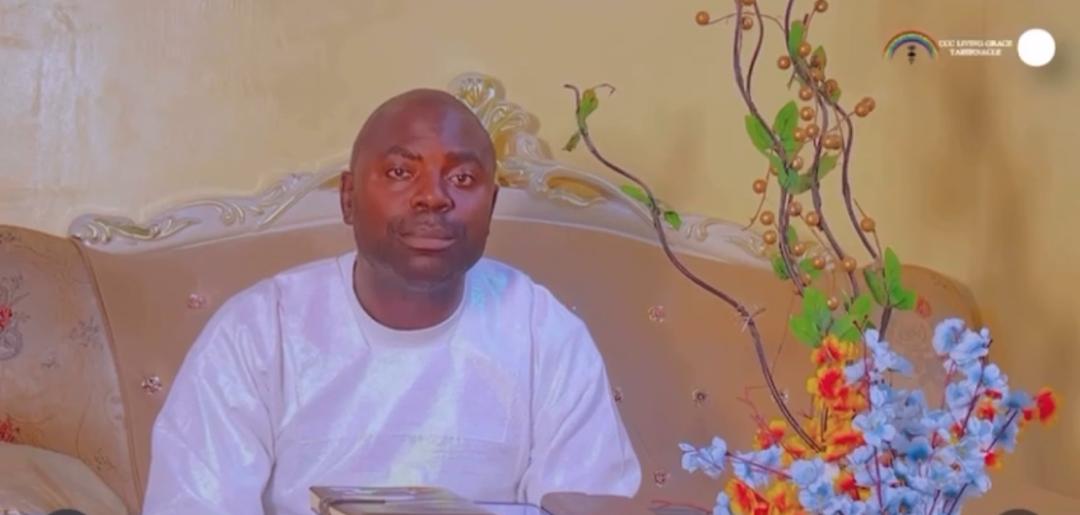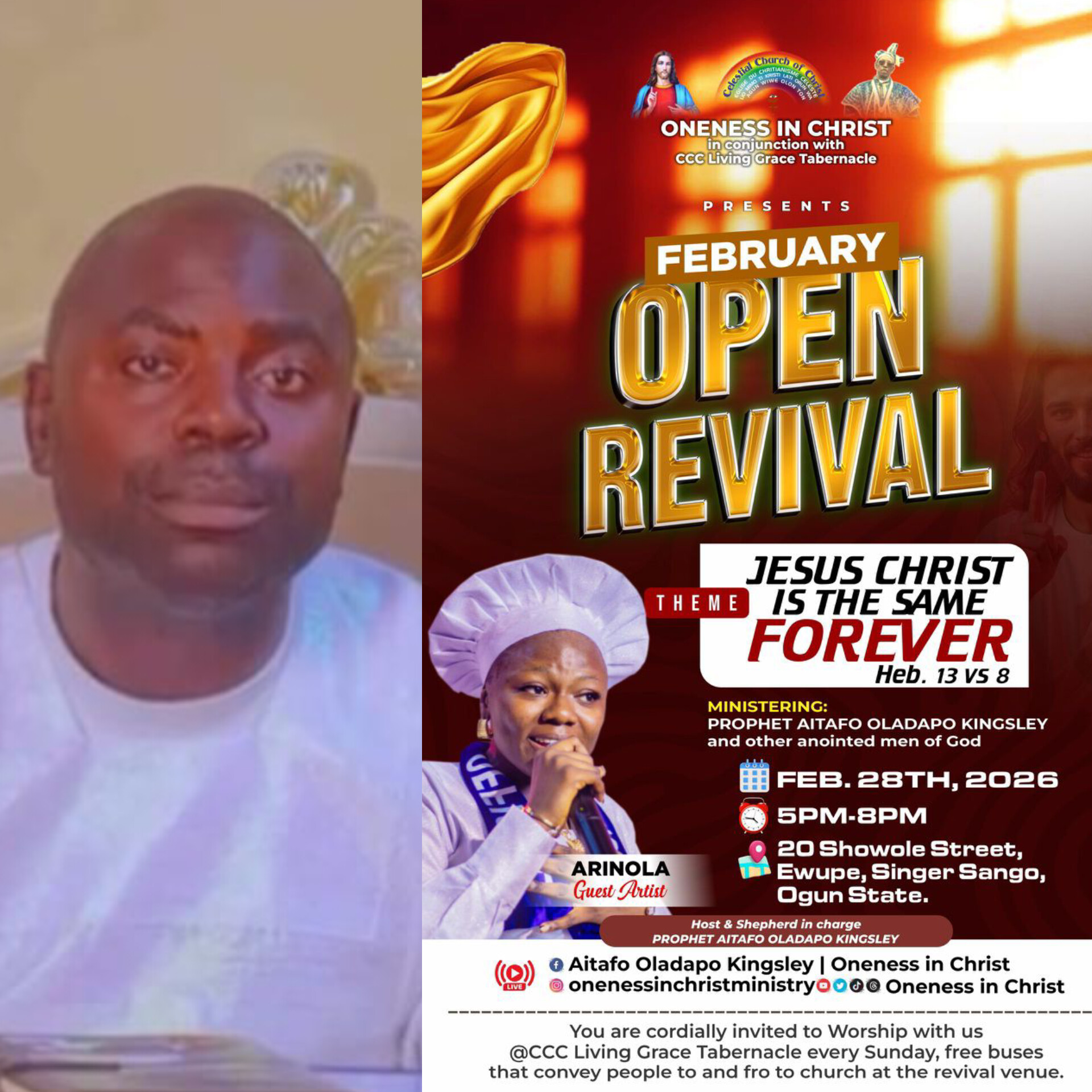news
Osinbajo Must Answer For N5.8b Fraud, Reps Insist

The House of Representatives ad-hoc committee on Emergency and Disaster Preparedness yesterday offered insight into why it indicted Vice President Yemi Osinbajo on the alleged diversion of N5.8 billion meant for emergency intervention in the north east.
The Chairman of the committee, Mr. Ali Isa J.C., who addressed reporters at the National Assembly Complex in Abuja, explained that there was no way Osinbajo could be exonerated from the alleged mismanagement of the fund.
Isa said: “Yes, of course, he (Osinbajo) does have questions to answer. He may have questions to answer because he is the chairman of the governing council of National Emergency Management Agency (NEMA) and he was the acting president that gave the approval.”
To justify his position, he brandished a memo (reference number SH/OVP/DCOS/HMF/010), dated June 1, 2017, which drew the attention of the former finance minister, Mrs. Kemi Adeosun, to an approval for the purchase of 30,905,08 metric tonnes of grains worth N5,036,644,933.26 and the cost for logistics and distribution of the grains put at N829,026,456.
The lawmaker also brandished another memo (HMF/FMF/CBN/FOOD/1/2017) dated June 2, 2017, in which Central Bank Governor, Mr. Godwin Emefiele, drew the attention of Adeosun, Osinbajo and the Accountant General of the Federation Ahmed Idris to the payment instruction for the aforementioned amount of money.
He further claimed that in breach of laid down procedure, the money was paid directly to five companies: Dangote Rice Limited (N936.1 million); Golden Agric Input Limited (N1.3 billion); BUA Rice Limited (N1.3bn); WACOT Limited (N453.6 million); and WACOT Limited (N939.9 million) while NEMA received N829 million for the transportation of the goods.
Isa, who insisted the report was not politically motivated, urged anti-graft agencies not to shirk their responsibilities by bringing to book anyone found wanting in the alleged theft.
In a report adopted last week, the House had indicted top government functionaries involved in the approval, processing, release and diversion of the money on the ground that they contravened the provisions of Section 80 (2) of the 1999 Constitution as amended.
But a statement by Osinbajo’s spokesman, Laolu Akande, criticised the committee’s “conclusion”, describing it as “false and misleading.”
The statement reads in part: “These presidential approvals were well within the clear constitutional authority of the acting president, who needed to take emergency steps to forestall acute food shortages in the affected states and there was nothing illegal or unconstitutional about them. The approvals were duly communicated by the Deputy Chief of Staff to the Central Bank Governor, Director General of NEMA and the Minister of Finance for implementation.
“On account of the emergency nature of the procurement, the House committee’s assumption that the ordinary rules of procurement would apply was wrong. Section 43 of the Public Procurement Act makes provision for emergency procurement, in which case the procuring entity is allowed to engage in direct contracting for goods and file a report thereafter with the Bureau of Public Procurement.
“It is also wrong to assume that taxes and interests accruable to government from these transactions in food items were deliberately ignored or waived by neglect. Of course, we expect that any loans advanced to any of the companies would be recovered with the agreed interests, and that any profits made by such companies would be liable to tax in the usual manner.
“The suggestion that the grains were never delivered to the target states is also blatant falsehood. In actual fact, in order to ensure effective distribution of the grains, an Emergency Food Intervention Project Team was established, consisting of the Director General of NEMA and representatives of the National Security Adviser, Chief of Defence Staff, Chief of Army Staff, Chief of Naval Staff, Chief of Air Staff, Department of State Security, Nigeria Police and the Presidency.
“The committee also worked with respective State Emergency Management Agencies, as well as humanitarian agencies such as World Food Programme, International Committee of the Red Cross, and the United Nations Office for the Coordination of Humanitarian Affairs. Deliveries were publicly made directly to the intended beneficiaries.
“In fact, the then acting president personally inspected the electronic truck-tracking unit established in Maiduguri for the purpose of monitoring the transportation and flagged off the food distribution on June 8, 2017. Besides, there was the integration of a robust monitoring and evaluation system into the operation, in order to facilitate a transparent and accountable process.
“Therefore, all insinuations on this matter regarding purported indictments and perceived violations of due process or the constitution are baseless and totally false. Such interpretations are flawed and should be utterly ignored.”
This came as the Peoples Democratic Party (PDP) asked Osinbajo to desist from “juggling figures” and “making false claims about the nation’s debt profile.” Accusing him of “playing to the camera”, the opposition party said: “Osinbajo is challenged to present to Nigerians the empty scorecard of APC’s failed administration, for which President Muhammadu Buhari has now lost his carriage as a leader.”
In a statement by its national publicity secretary, Kola Ologbondiyan, in Abuja yesterday, the PDP claimed “Nigerians are alarmed that Osinbajo, a professor of law, has allowed himself to be turned into a vendor of propaganda and false claims for a corrupt administration now hanging on straws. He is the head of Buhari’s bungling economic team and should therefore, not in anyway, parade himself as if he has no blame at all in the manifest failures of this administration.”
In another development, Mr. Nasiru Ingawa, a one-time special adviser to former governor Ibrahim Shema of Katsina State on SURE-P, yesterday told a Federal High Court in Katsina how Shema allegedly directed him to use about N5.7 billion state SURE-P (Subsidy Reinvestment and Empowerment Programme) funds for politics during his tenure.
The adviser testified at the resumed hearing of a fraud case against Shema.
The News Agency of Nigeria (NAN) reports that Shema is standing trial before the court on a 26-count charge bordering on fraud, in contravention of Section 15(2d) of the Money Laundering Prohibition Act, 2011, as amended. The offences are punishable under Section 15 (3) of the Act. The Economic and Financial Crimes Commission (EFCC) preferred the charges.
Ingawa told the court that he was the special adviser to Shema on SURE-P from June 2014 to May 2015. He said: “I remember him (Shema) telling me that we were going to use the funds for politics and that we would extract our savings from there.” He said they wrote memos for certain programmes and used half of the money, while the remainder went into savings.
Ingawa also said that the department made direct purchases from which a certain percentage would go into savings. He noted that sometimes, they wrote memos for programmes not implemented at all.
After the evidence, the prosecution counsel, Mr. O. I. Uket, applied for adjournment, which the defence counsel did not object to.
Justice Hadiza Rabiu Shagari adjourned the case till January 14, 2019, for the continuation of the trial.
news
Journalists for Good Governance Shines Searchlight on Local Government Administration

Journalists for Good Governance Shines Searchlight on Local Government Administration
…Calls for Accountability in Nigeria’s Grassroots Governance
LAGOS, Nigeria — A civil society coalition known as Journalists for Good Governance(JGG) has intensified public debate on transparency and accountability within Nigeria’s local government system, urging media professionals, civil society actors, and citizens to hold grassroots leaders accountable.
Speaking an event in Lagos recently, the acting chairman of the society, Comrade Bunmi Obarotimi said that despite reforms such as the Supreme Court’s 2024 ruling granting financial autonomy to all 774 Local Government Areas (LGAs), systemic challenges continues to hinder effective service delivery and responsible stewardship of public funds.
“Local governments are the closest tier of government to the people — yet too often they remain the least transparent. Without civic oversight and vibrant media, promises of autonomy ring hollow.” the acting chairman said.
The Journalist for Good Governance emphasised crucial roles that journalists can play in uncovering discrepancies in council spending, flagging poor service delivery, and educating citizens on their rights. Their call comes amid wider efforts by media and civic organisations to bridge accountability gaps. The civil society initiatives had previously launched monitoring campaigns to track local government expenditures and have been quietly advocating for transparency in how public money is deployed.
The leaders of the Journalists for Good Governance (JGG) highlighted the importance of physical assessment and citizens engagement on projects to boost people’s confidence, urging local councils to adopt open data platforms and proactive information dissemination in compliance with the Freedom of Information Act. Experts say the majority of LGAs currently lack operational websites or digital portals, further limiting public scrutiny.
The Journalists for Good Governance initiative aligns with sustained advocacy by civil society groups and governance experts calling for a collective approach to strengthening democratic accountability, and has decided to engage in critical and holistic assessments of how Local Governments is being run and the impact and quality of projects they embark-on and to address deficits in transparency and public trust.
Meanwhile, some state governments have signalled support for improved community engagement. In Lagos State, authorities reiterated a commitment to enhancing community media platforms as vehicles for civic participation and accountability at the grassroots level.
The renewed spotlight on local government administration has reignited public debate over fiscal responsibility and priorities. Controversies such as the widely criticised Adamawa council chairmen’s wives trip to Istanbul — which drew public outrage for perceived misuse of public funds — underscore why watchdog groups say stronger oversight mechanisms are urgently needed at the grassroots.
Citizens and activists have welcomed the journalists’ initiative, calling for sustained media engagement that goes beyond headlines to influence policy and accountability reform.
The civic rights advocates note that real change will require robust legal frameworks, a free press, and empowered communities equipped to demand transparency at every level of governance.
As Journalists for Good Governance mobilises its members, the coming months are likely to see heightened media attention on grassroots administration — from council budgets and service delivery to the enforcement of public information laws and digital transparency initiatives.
news
ANOTHER PROPHECY FULFILLMENT BY PROPHET KINGSLEY AITAFO OVER THE EXIT OF DR. KENOLY, ANNOUNCING FEBRUARY’S OPEN PROPHETIC REVIVAL

ANOTHER PROPHECY FULFILLMENT BY PROPHET KINGSLEY AITAFO OVER THE EXIT OF DR. KENOLY, ANNOUNCING FEBRUARY’S OPEN PROPHETIC REVIVAL
– Another Prophecy Fulfillment by Prophet Kingsley Aitafo Following the Passing of Ron Kenoly Ahead of February Open Prophetic Revival
– Prophet Kingsley Aitafo Records Another Prophecy Fulfillment as February Open Prophetic Revival Is Announced
In the released prophecies for 2026, renowned Nigerian cleric, Prophet Kingsley Aitafo, shared a series of revelations touching on Nigeria’s economy, global events, political transitions, natural disasters, religious transformations, and the future of world leaders.
During a special prophetic session, the prophet stated that he foresaw the departure of two world-renowned musicians in 2026 and urged the Nigerian people and the global community to pray for them.
He urged Nigerians and everyone around the globe to pray for the musicians, among other prophecies, and already gave insight concerning them.
On February 3, 2026, American gospel singer, songwriter, and worship leader Ron Kenoly passed away at the age of 81. Widely known as the “Professor of Praise,” Kenoly was celebrated for anthems such as “Majesty” and “Lift Him Up,” which have significantly influenced modern congregational worship around the world.
He was recognized as a pioneer of the contemporary praise and worship movement, leading Scripture-based worship services that became widely adopted in churches across different nations and cultures.
The development has been described by followers of Prophet Kingsley Aitafo as a confirmation of the prophecy earlier declared in the year.
Meanwhile, Prophet Kingsley Aitafo, leader and shepherd in charge of Oneness in Christ, in conjunction with CCC Living Grace Tabernacle, invites everyone to its February Open Revival. It is a prophetic service determined to change lives through miracles, healings, signs, and wonders.
It is not an ordinary service; it is another time for a divine encounter where your faith is strengthened, prayers are answered, and breakthroughs and favour are about to rain. With its theme — Jesus Christ is the same forever — the revival is promised to release the power of Jesus Christ like never before. It is a period of shift and divine encounter.
This revival service is said to hold on the 25th of February, 2026, from 5pm – 8pm at 20, Showole Street, Ewupe, Singer Sango, Ogun State.
It is a season where God is ready to reveal Himself like never before. Members of the public are invited to attend.
news
GEN CHRISTOPHER GWABIN MUSA SUPPORT INITIATIVE COMMENDS STATE-FEDERAL COLLABORATION IN ZAMFARA

GEN CHRISTOPHER GWABIN MUSA SUPPORT INITIATIVE COMMENDS STATE-FEDERAL COLLABORATION IN ZAMFARA
The Gen Christopher Gwabin Musa Support Initiative (GCGMSI) has commended the Zamfara State Government for its decisive contribution to security operations through the donation of newly acquired armoured personnel carriers (APCs), surveillance drones, and other critical operational equipment to troops and security agencies in the state.
This commendation was contained in a statement signed by the Convener of the GCGMSI, Ibrahim Dahiru Danfulani, Sadaukin Garkuwan Keffi/Betara Biu, and made available to the press.
The equipment was formally commissioned on Wednesday, February 18, by the Grand Patron of the GCGMSI and Minister of Defence, General Christopher Gwabin Musa, OFR (rtd.), in a ceremony at the Government House, Gusau. The event was attended by senior military officers, heads of security agencies, and top officials of the Zamfara State Government.
The GCGMSI, in its statement, hailed the donation as a “transformative and timely intervention” that aligns perfectly with its core objective of advocating for and supporting tangible measures that enhance the operational capacity and welfare of Nigeria’s security forces. The Initiative praised Governor Dauda Lawal’s administration for moving beyond rhetoric to actionable, material support, describing the move as a “blueprint for state-level collaboration in national security.”
“The provision of these assets by the Zamfara State Government is a testament to visionary leadership and a profound commitment to the peace and stability of its people,” the GCGMSI statement read. “It represents the exact kind of synergistic partnership between state and federal authorities that the GCGMSI champions. This initiative will significantly close operational gaps, boost the confidence of our gallant troops, and send a strong message to criminal elements.”
Speaking at the commissioning, General Musa emphasized that sustained collaboration is indispensable in confronting the nation’s evolving security challenges. He specifically commended Governor Lawal for his proactive support.
“Governor Dauda Lawal has demonstrated exemplary leadership and an unwavering dedication to the security of Zamfara State,” the Defence Minister stated. “The provision of these armoured vehicles, surveillance drones, and other operational equipment will undoubtedly boost the morale and operational effectiveness of our troops and other security agencies on the ground. This is a commendable effort that should be emulated by others.”
The newly commissioned assets, which include multiple APCs and advanced surveillance drones, are expected to dramatically enhance the mobility, protection, intelligence-gathering, and rapid response capabilities of security forces, particularly in the state’s remote and difficult terrains where anti-banditry operations are ongoing.
In his remarks, Governor Lawal reiterated his administration’s steadfast commitment to being a reliable partner in the security architecture. He urged security agencies to deploy the new resources responsibly and effectively to safeguard lives and property.
The Federal Government, through the Ministry of Defence, reaffirmed its commitment to continuing and deepening such partnerships with state governments across the nation to strengthen coordination and resource allocation in the collective fight against insecurity.
The GCGMSI concluded its statement by urging other state governments to take a cue from Zamfara’s “bold and pragmatic” approach, affirming that such concrete support is vital for achieving lasting peace and security across Nigeria.
-

 celebrity radar - gossips6 months ago
celebrity radar - gossips6 months agoWhy Babangida’s Hilltop Home Became Nigeria’s Political “Mecca”
-

 society5 months ago
society5 months agoReligion: Africa’s Oldest Weapon of Enslavement and the Forgotten Truth
-

 society6 months ago
society6 months agoPower is a Loan, Not a Possession: The Sacred Duty of Planting People
-

 news6 months ago
news6 months agoTHE APPOINTMENT OF WASIU AYINDE BY THE FEDERAL GOVERNMENT AS AN AMBASSADOR SOUNDS EMBARRASSING












You must be logged in to post a comment Login